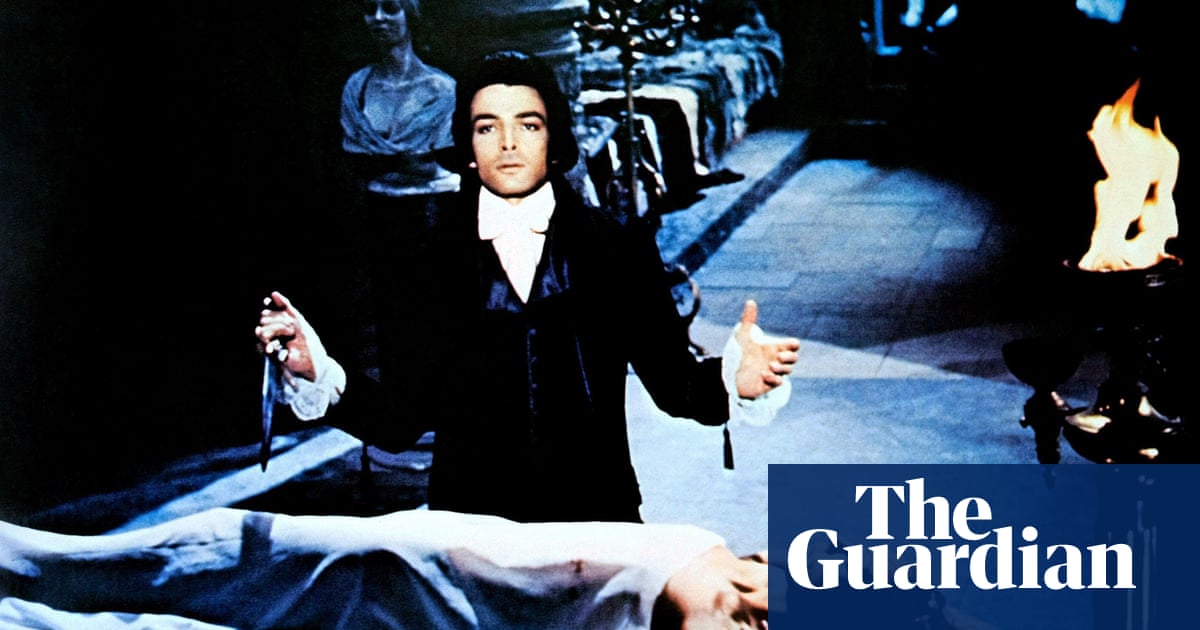Damien Thomas, who has died aged 83 after suffering from progressive supranuclear palsy, was an actor best remembered for taking the leading role of a wicked count turned into a vampire in Twins of Evil, a 1971 film combining gothic horror, black magic rituals and two Playboy playmates in the title parts.
Themovie’s trailerbilled him as “Hammer’s new master of the macabre”, alongsidePeter Cushingas the witch-hunting Puritan religious sect leader Gustav Weil, whose orphaned nieces, Maria and Frieda, played by the identical twins Mary and Madeleine Collinson, live with him in an Austrian village. “It was quite difficult to tell the twins apart, but I used to pretend I knew which one was which,” Thomas said.
The witchfinder theme was added to the original stories featured inSheridan Le Fanu’s 1872 novellaCarmillafor this final film in Hammer’s Karnstein trilogy of vampire sagas, following The Vampire Lovers and Lust for a Vampire.
In Twins of Evil, the rebellious Frieda finds an escape from her controlling uncle with his neighbour, the blasphemous Count Karnstein (Thomas). By then, he has already turned a mock sacrificial rite into reality at Karnstein castle.
Having previously worked mostly in theatre, Thomas said he tried to give a Shakespearean performance, bellowing out his lines with an air of arrogance and self-confidence.
But the film failed to turn him into a top screen star. “After Twins of Evil, I was about to face a couple of the worst years of my career,” he said. Instead,hebecame a prolific character actor on television over the next 50 years. His parts included the Portuguese Jesuit priest and translatorFather Martin Alvito in Shogun, the 1980 US miniseries starringRichard Chamberlainas a 17th-century English ship’s navigator captured by samurai warriors in Japan.
Among Thomas’s occasional film parts wasDon Alfonso de la Torré, the ruthless first mate who makes life difficult for the ship’s captain, played byWalter Matthau, in Pirates (1986), a swashbuckling comedy adventure directed by Roman Polanski.
Although it fulfilled Polanski’s dream of making a pirate movie, the film bombed at the box office. Initially, Thomas blamed himself, recalling in 2013 that he left the premiere thinking: “That’s the end of my career. The film is a disaster because it’s me, my fault – all that English overacting.”
But he added: “I went to see it recently at the BFI on the Southbank and, to my amazement, I realised that it wasn’t me at all. Actually, I’m not so awful in it. The weakness of the film is Walter Matthau.” He said the cockney voice adopted by the Hollywood star was “so laboured and so slow” that it affected the pace of the film.
Damien was born in Ismailia, on the west bank of the Suez canal, to Huguette (nee Bertrand), herself born in Egypt of French parents, and Peter Court-Thomas, an RAF squadron leader posted there during the second world war.
Seven months later, his father died after being shot down in action and was awarded the Distinguished Flying Cross. Following her move to Britain, his mother married Charles Lofthouse; Damien was educated at Wellington school, Somerset, and studied art at Dartington College, Devon, before training at Rada. On graduating in 1966, he gained experience in repertory theatre and made his screen debut in Love with a Few Hairs (1967), an episode in the BBC television series Boy Meets Girl. He played a Moroccan bartender seeking a love potion from a witch when the young woman he falls for (Felicity Kendal) shows no interest in him. A year later, he was cast by Hammer in a small part for a story in its anthology TV series Journey to the Unknown.
His first film role was as Cassius’s loyal servant Pindarus in Julius Caesar (1970), starringJohn Gielgud. Supporting roles followed on the big screen as Anne Boleyn’s court musician Smeaton in Henry VIII and His Six Wives (1972), the prophet Mohammed’s son Zaid in The Message (1976) and Kassim in human form, before the character is turned into a baboon, inRay Harryhausen’s fantasy Sinbad and the Eye of the Tiger (1977), directed by Sam Wanamaker.
On television, his dozens of parts included a Greek Cypriot suspected of looking for revenge on British soldiers who hanged his terrorist father in Special Branch (1969); Atlan, leader of the Space Rats, in Blakes 7 (1981); the pivotal character of Richard Mason, bringing trouble to Thornfield Hall, in Jane Eyre (1983); and Jake Haulter, a Swiss-born wheeler-dealer looking to make money in postwar Singapore, in Tenko (1984) and Tenko Reunion (1985).
Later, he was seen as Herod Agrippa, the last king of Judea, in A.D. (1985); villains such as Mortimer Tregennis in The Return of Sherlock Holmes (1988); Michael Samuels, the liberal environment secretary smeared by Francis Urquhart (Ian Richardson) in the race to become Conservative party leader and prime minister, in House of Cards (1990); and Mr Harris, the apothecary, in Sense and Sensibility (2008).
A highlight of Thomas’s stage career came as Worthy in The Relapse, John Vanbrugh’s Restoration comedy, at the Old Vic (1981), “a part spoken with a rich, resonant fluency”, wrote one critic. Later, he understudied Frank Langella as the American president in the original production of Peter Morgan’s playFrost/Nixonat the Donmar Warehouse (2006).
Thomas’s first two marriages, to Jocelyne Sbath in 1968 and Françoise Alaoui-Drai in 1980, ended in divorce.
He is survived by his third wife, Julia (nee Sargent), whom he married in 2012, Maud and Phoebe, their daughters, Dominic, the son of his second marriage, and his stepchildren, Kirsty, Hannah and Gabe.
Damien Thomas (Damien Roy Charles Noel Court-Thomas), actor, born 11 April 1942; died 18 April 2025
